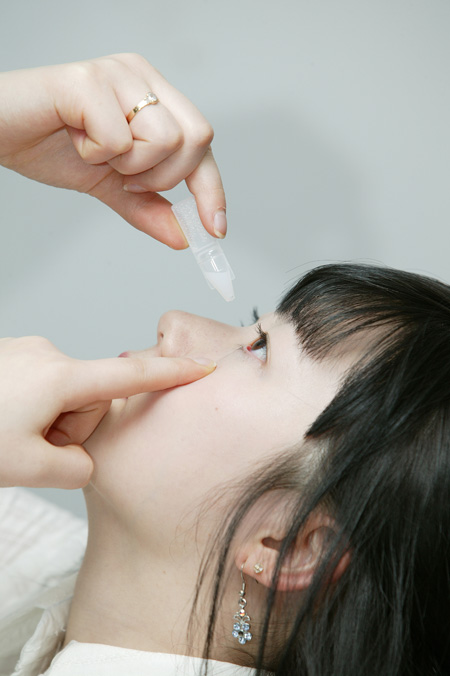- California Assembly OKs highest minimum wage in nation
- S. Korea unveils first graphic cigarette warnings
- US joins with South Korea, Japan in bid to deter North Korea
- LPGA golfer Chun In-gee finally back in action
- S. Korea won’t be top seed in final World Cup qualification round
- US men’s soccer misses 2nd straight Olympics
- US back on track in qualifying with 4-0 win over Guatemala
- High-intensity workout injuries spawn cottage industry
- CDC expands range of Zika mosquitoes into parts of Northeast
- Who knew? ‘The Walking Dead’ is helping families connect
Higher cholesterol levels may worsen dry eye syndrome in women

The symptoms of the dry eye syndrome worsen especially when the weather is dry or the air is contaminated with ultrafine dust. (Korea Times file)
By Yoon Ja-young
As the number of people suffering with dry eye syndrome (DES) increases amid fine dust and dry weather, research shows that high blood cholesterol increases the risk of the condition in women.
After analyzing health and nutrition data on 5,627 Koreans, a research team led by Prof. Na Kyung-sun at Seoul St. Mary’s Hospital found that five percent of males and 15 percent of females have dry eye syndrome. The ratio was especially high among females with high blood cholesterol levels. Those with readings of more than 200 mg/dL faced 1.77 times bigger risk of developing DES than the general population.
The research team estimated that it has to do with the problem in the meibomian glands, which are responsible for 70 to 80 percent of dry eye diseases in Asians. The meibomian glands are located in the eyelid. These secrete oily matter onto the ocular surface, preventing excessive drying up of tears. Too much cholesterol in the blood, meanwhile, obstructs the gland, making tears easily dry up and thus drying the eyes.
According to the National Health Insurance Service, 2.2 million people were treated for DES in 2011, marking an annual 11.4 percent growth during the past five years.
It is one of the most common eye problems, where lack of tears or excessive drying up of tears damages the ocular surface. As the eyes become dry, the eyes turn red, feel hot and become uncomfortable. Some people suffer visual disturbance and blink their eyes too frequently.
The symptoms worsen especially when the weather is dry or the air is contaminated with ultrafine dust, yellow dust, or other pollutants.
Recently, excessive use of smartphones is also contributing to DES. When people concentrate on something, they blink much less than usual. Male adults, for instance, blink their eyes 20 times a minute on average, and females around 15 times, but these numbers fall to half, each, when they concentrate on smartphones. It not only tires the eyes but also makes them dry. Contact lenses and laser vision correcting surgeries such as LASIK are also known to cause dry eyes because they affect the ocular surface.
The doctor said that DES is not simply a symptom of tears drying up but a disease caused by disorder in the secretion of tears and circulation, and added that it needs customized treatment because there can be diverse causes such as inflammation, hormonal changes or immune problems. “The study revealed the correlation between the dyslipidemia and the dry eye disease for the first time in the country. Those with the dyslipidemia are recommended to get their eyes examined on top of controlling the blood cholesterol level,” Prof. Na said.
For prevention, she recommended “maintaining enough humidity indoor while heating up in winter, and take a rest from time to time when using computer or smartphone. Try to blink your eyes often or close your eyes for a while so that tears can moisturize them.”
She stressed early diagnosis. “If you just continue using eye drops getting easily tired and uncomfortable, symptoms may worsen, leading to keratitis and poor eyesight in serious cases. Don’t forget to consult a doctor if you have symptoms,” the doctor said.
The research was published in the June edition of “Lipids in health and disease,” an international journal.









![일본 사도광산 [서경덕 교수 제공. 재판매 및 DB 금지]](http://www.koreatimesus.com/wp-content/uploads/2024/07/PYH2024072610800050400_P4-copy-120x134.jpg)


